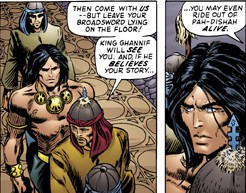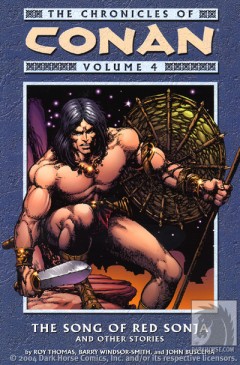The
Chronicles of Conan:
The Song of Red Sonja
I’m
really not a big fan of “retro.” I remember when
bell bottoms started showing up in my high school’s
hallways and thinking how much time it would save the janitors
in sweeping. I’ve never liked a movie re-made from some
invariably bad 1970s sitcom or Almost Famous-like
romps through the formative years of young adulthood set against
the backdrop of the sexual, civil rights or yuppie revolutions.
I remember rooting for those damn little kids in Stand
By Me to actually get hit by the train, and wishing that
Kevin kid from The Wonder Years would go on a Son
of Sam-like killing spree, if to only alleviate my boredom
while watching the show (which my mother forced me to watch
by the way).
It might
be safer to say that I really hate the concept of “retro.”
My hatred
even extends to the realm of comic books. I see people scrambling
to buy the phone book editions of Marvel Comic’s reprints
from the original issues of Avengers, The Amazing Spider-Man,
and Tomb of Dracula, and I ask myself why? Don’t
get me wrong: the creators from that era should always be
commended for what they did. Where would comics be without
Jack Kirby or Stan Lee? Eisner? Buscema? These were the
men who made comics into something so much more than newsprint
and a pale color palette; they made it into an art form,
creating the conventions that all comic book creators now
have to recognize while dabbling in the three-color-ink
world. There is no disputing the worth of that work.
But
when I read something from the 1950s, 60s, or 70s I can
only compare it to the modern books I read, because I grew
up reading my generation’s comics. And by my generation’s
standards, reading done-in-one adventures of Spider-Man
fighting yet another animal based villain is not exactly
my cup of Earl Grey. I get bored reading the old stuff,
which sounds as sacrilegious to comic readers as screaming
“Praise Jesus!” in the middle of a Bar Mitzvah,
but I really don’t find myself having an enjoyable
read. For this reason, I’m always hesitant to pick
up any collection from long in the past, collecting what
might be the work of some of comicdom’s iconic creators,
but what also might bore me to self flagellation.
But
damn Kurt Busiek for making me like an old character enough
to go in search of the original material: Conan the Barbarian.
Dark Horse comics, in conjunction with the monthly revival
comic by Busiek and Cary Nord, has been collecting and reprinting
the original comic adaptations of Robert E. Howard’s
most notorious barbarian, which were printed by Marvel back
in the 1970s. And because I like being non-sequitir, the
fourth volume The Song of Red Sonja and Other Stories
is on the review table. Well, the review computer desk,
which is adjacent to the review mattress. It’s a well-oiled
system.
The
Song of Red Sonja collects three issues of the Marvel
published series (#23-36) and the graphic novella “Red
Nails” that appeared in Savage Tales, which
seems short, but the richness of the story, of the prose
alone, makes this a densely satisfying read. Probably because
the story itself is set in the distant past and in the barely
discernible locations of the Middle East, Africa and Eastern
Europe, it doesn’t suffer from dating. There’s
no slang from the time period of the writers (I could live
the rest of my life without hearing “jive turkey”
spoken again) cluttering the text.
Instead,
writer Roy Thomas gives all the characters an eloquent dialectal
nod, something of a combination of Shakespearean stage voice
and barroom limericks meant to take the reader away from
whatever year they live in and place them smack down in
the middle of a world of giant serpents, holy wars, and
barbarous bloodshed. The caption box narration in the piece,
which is something that doesn’t appear as much in
these days of minimalist comics, is so well put together
one would think Thomas lifted Howard’s prose right
off the page and transplanted it seamlessly into the artwork.
The narration rides and directs the visual story incredibly
well, which shocked the hell out of my retro-phob-ish self
because I’d always thought of seamless blend of word
and picture to be something more modern. Color me wrong.
 |
Also
surprising is that I find that I didn’t know the character
Conan as well as I thought I did. Granted, he’s a
big, hulking barbarian (at least the movies would have you
believe so), but the way that Windsor-Smith and Buscema
draw him accentuates his more streamlined physique; he’s
as agile as he is strong, and far more intelligent that
the label “barbarian” would suggest.
And
Conan is not only a fighter, but a thief of some renown.
Thomas writes him as a scoundrel; working by little in way
of principles, Conan takes what he wants as long as doing
so will not cause him any undue discomfort, and is perfectly
willing to kill for his prizes, be they swag or more tender
rewards.
I had
expected women would be paltry shadows of their male counterparts
in this series, especially with Conan hedonistically lusting
after each woman me meets, but the females are nothing if
not hard edged and able to stand toe to toe with any male
fighter in the book. Red Sonja is shown to be both a great
warrior and a leader of men, and possessed of a deviously
cunning mind as she manipulates Conan to her own ends. The
warrior Valeria of the Red Brotherhood is a pirate and swordswoman
of note and fights comfortably alongside the Cimmerian against
the denizens of a jade city in “Red Nails.”
Also
of note is the way that Thomas and Windsor-Smith manage
to balance the feminine aspect of these warriors with their
aggressive nature. They’re not tender young waifs
by any means, but Thomas employs the knowledge of some of
the less desirable womanly traits (that pesky one that allows
woman to lead us around by the short hairs is always a powerful
one) and include it in his characterization. Red Sonja is
a layered individual, and Thomas shows off her many sides;
from warrior, to seductress, to criminal, throughout her
short stint in the book.
The
artwork is gorgeous. Barry Windsor-Smith is one of those
names that floats around comicdom, carrying with it an impressive
list of accolades, but with whom I was not familiar until
now. It’s notes in the afterword by Thomas that Windsor-Smith
would spend so much time detailing his pages and self-inking
that delays were almost inevitable in publication. The level
of detail and of draftsmanship is a visual feast, and it
makes the artwork by Buscema, whose work is by no means
less than great, look simple in the comparison. Windsor-Smith
can draw bloodshed as easily as drawing the supple form
of a female that makes all manner of sinful imaginings spring
to life, and both are beautiful to behold. There are no
less than five separate colorists working within these pages,
but the one of note is Richard Isanove, whom to it fell
to give the first chapter of “Red Nails,” which
had been black and white until recently, the color treatment.
He managed only to add to the great work of Windsor-Smith.
This
volume is one of six that Dark Horse currently has available,
re-chronicling the adventures of Conan, and while this is
a great comic that reads wonderfully by it’s self,
I’d recommend picking up the earlier volumes first.
There are some story elements that are wrapped up in this
volume that came from the earlier ones, including the climactic
ending to a Holy war and a war of vengeance between Conan
and another warrior that would be best served having read
the prior stories. I am shocked at how much I like this
comic and it is well worth the $15.95 price tag Dark Horse
slapped on. If more stuff this good from yester-year sees
collection, I might be cured of my retrophobia someday.
Until
then, shun the old like we always do!
Chronicles
of Conan: The Song of Red Sonja and Other Stories
|







